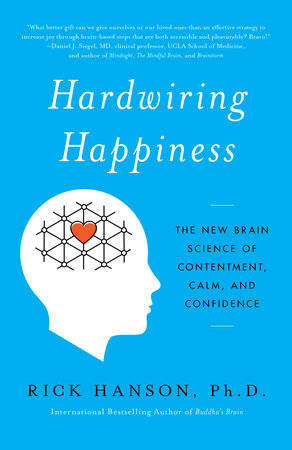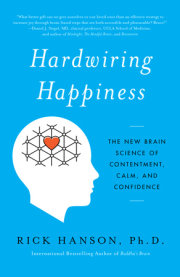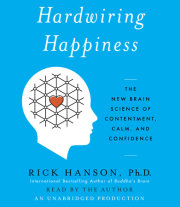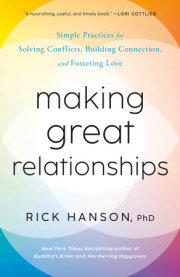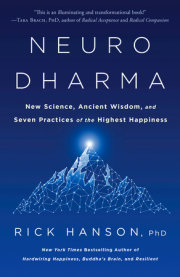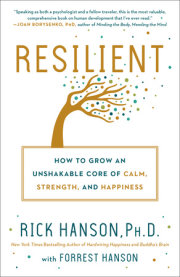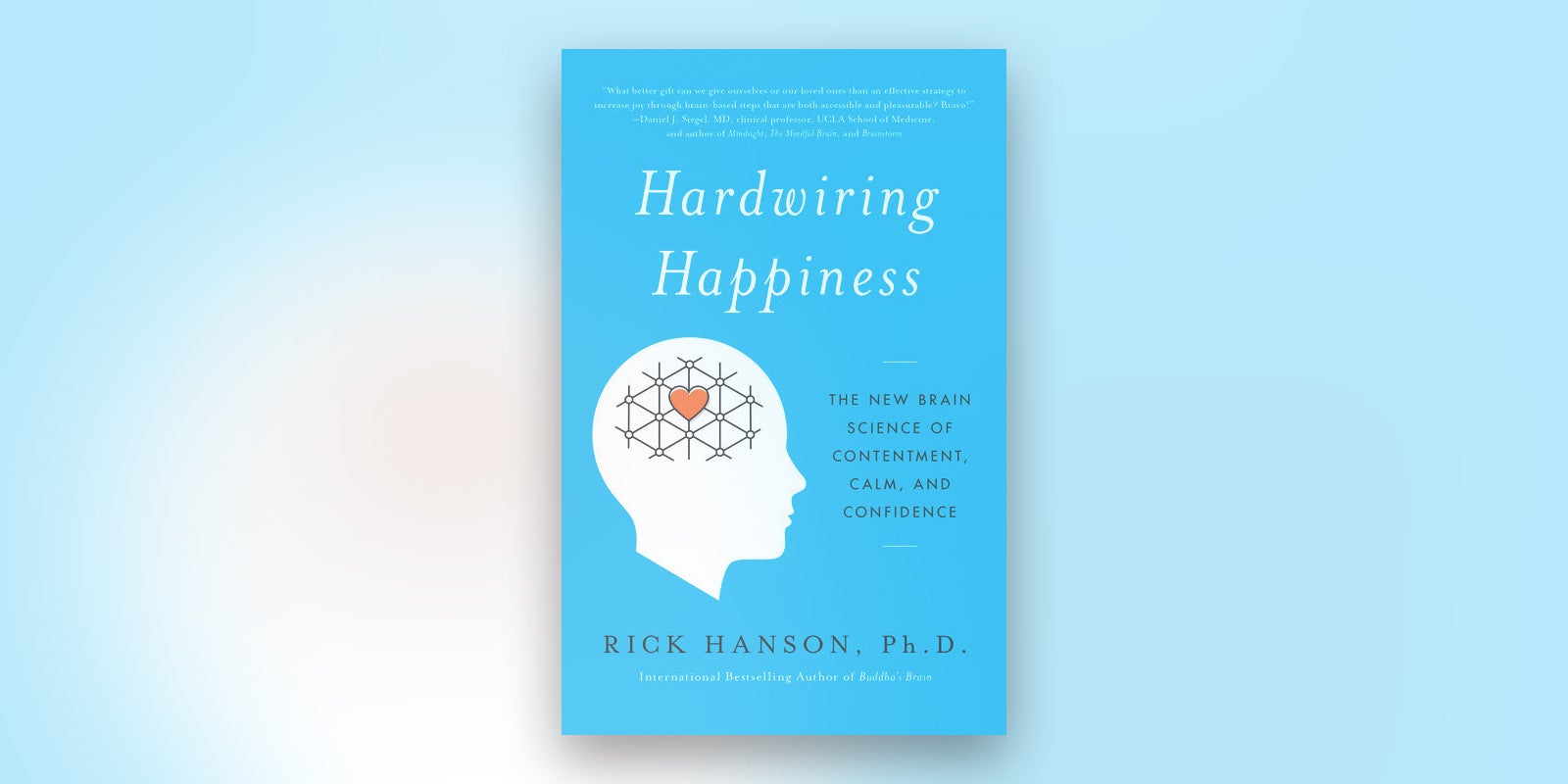Chapter 1
Growing Good
Going through school, I was a year or two younger than the other kids in my grade, a shy, skinny, nerdy boy with glasses. Nothing awful happened to me, but it felt like I was watching everyone else through a wall of glass. An outsider, ignored, unwanted, put down. My troubles were small compared to those of many other people. But we all have natural needs to feel seen and valued, especially as children. When these needs aren't met, it's like living on a thin soup. You'll survive, but you won't feel fully nourished. For me, it felt like there was an empty place inside, a hole in my heart.
But while I was in college I stumbled on something that seemed remarkable then, and still seems remarkable to me now. Some small thing would be happening. It could be a few guys saying, "Come on, let's go get pizza," or a young woman smiling at me. Not a big deal. But I found that if I let the good fact become a good experience, not just an idea, and then stayed with it for at least a few breaths, not brushing it off or moving on fast to something else, it felt like something good was sinking into me, becoming a part of me. In effect, I was taking in the good--a dozen seconds at a time. It was quick, easy, and enjoyable. And I started feeling better.
In the beginning the hole in my heart seemed as big as an empty swimming pool. But taking in a few experiences each day of being included, appreciated, or cared about felt like tossing a few buckets of water into the pool. Day after day, bucket after bucket, month after month, I was gradually filling that hole in my heart. This practice lifted my mood and made me feel increasingly at ease, cheerful, and confident.
Many years later, after becoming a psychologist, I learned why doing this seemingly small practice had made such a large difference for me. I'd been weaving inner strengths into the fabric of my brain, my mind, and my life--which is what I mean by "hardwiring happiness."
Inner Strengths
I've hiked a lot and have often had to depend on what was in my pack. Inner strengths are the supplies you've got in your pack as you make your way down the twisting and often hard road of life. They include a positive mood, common sense, integrity, inner peace, determination, and a warm heart. Researchers have identified other strengths as well, such as self-compassion, secure attachment, emotional intelligence, learned optimism, the relaxation response, self-esteem, distress tolerance, self-regulation, resilience, and executive functions. I'm using the word strength broadly to include positive feelings such as calm, contentment, and caring, as well as skills, useful perspectives and inclinations, and embodied qualities such as vitality or relaxation. Unlike fleeting mental states, inner strengths are stable traits, an enduring source of well-being, wise and effective action, and contributions to others.
The idea of inner strengths might seem abstract at first. Let's bring it down to earth with some concrete examples. The alarm goes off and you'd rather snooze--so you find the will to get up. Let's say you have kids and they're squabbling and it's frustrating--so instead of yelling, you get in touch with that place inside that's firm but not angry. You're embarrassed about making a mistake at work--so you call up a sense of worth from past accomplishments. You get stressed racing around--so you find some welcome calm in several long exhalations. You feel sad about not having a partner--so you find some comfort in thinking about the friends you do have. Throughout your day, other inner strengths are operating automatically in the back of your mind, such as a sense of perspective, faith, or self-awareness.
A well-known idea in medicine and psychology is that how you feel and act--both over the course of your life and in specific relationships and situations--is determined by three factors: the challenges you face, the vulnerabilities these challenges grind on, and the strengths you have for meeting your challenges and protecting your vulnerabilities. For example, the challenge of a critical boss would be intensified by a person's vulnerability to anxiety, but he or she could cope by calling on inner strengths of self-soothing and feeling respected by others.
We all have vulnerabilities. Personally, I wish it were not so easy for me to become worried and self-critical. And life has no end of challenges, from minor hassles like dropped cell phone calls to old age, disease, and death. You need strengths to deal with challenges and vulnerabilities, and as either or both of these grow, so must your strengths to match them. If you want to feel less stressed, anxious, frustrated, irritable, depressed, -disappointed, lonely, guilty, hurt, or inadequate, having more inner strengths will help you.
Inner strengths are fundamental to a happy, productive, and loving life. For example, research on just one strength, positive emotions, shows that these reduce reactivity and stress, help heal psychological wounds, and improve resilience, well-being, and life satisfaction. Positive emotions encourage the pursuit of opportunities, create positive cycles, and promote success. They also strengthen your immune system, protect your heart, and foster a healthier and longer life.
On average, about a third of a person's strengths are innate, built into his or her genetically based temperament, talents, mood, and personality. The other two-thirds are developed over time. You get them by growing them. To me this is wonderful news, since it means that we can develop the happiness and other inner strengths that foster fulfillment, love, effectiveness, wisdom, and inner peace. Finding out how to grow these strengths inside you could be the most important thing you ever learn. That's what this book is all about.
In the Garden
Imagine that your mind is like a garden. You could simply be with it, looking at its weeds and flowers without judging or changing anything. Second, you could pull weeds by decreasing what's negative in your mind. Third, you could grow flowers by increasing the positive in your mind. (See the box on page 7 for what I mean by positive and negative.) In essence, you can manage your mind in three primary ways: let be, let go, let in. This book is about the third one, the cultivation of inner strengths: growing flowers in the garden of the mind. To help you do this most effectively, I'd like to relate it to the other two ways to approach your mind.
WHAT IS POSITIVE?
By positive and good, I mean what leads to happiness and benefit for oneself and others. Negative and bad mean what leads to suffering and harm. I'm being pragmatic here, not moralistic or religious.
Positive experiences usually feel good. But some experiences that feel bad have good results, so I'll refer to them as positive. For example, the pain of a hand on a hot stove, the anxiety at not finding your child at a park, and the remorse that helps us take the high road make us feel bad now to help us feel better later.
Similarly, negative experiences usually feel bad. But some experiences that feel good have bad results, and I'll call these negative. The buzz from three beers or the vengeance in gossiping about someone who wronged you may feel momentarily pleasurable, but the costs outweigh the benefits. Experiences like these make us feel good now but worse later.
Being with Your Mind
Letting your mind be, simply observing your experience, gives you relief and perspective, like stepping out of a movie screen and watching from twenty rows back. Letting the stream of consciousness run on its own helps you stop chasing what's pleasant and struggling with what's unpleasant. You can explore your experience with interest and (hopefully) kindness toward yourself, and perhaps connect with softer, more vulnerable, and possibly younger layers in your mind. In the light of an accepting, nonreactive awareness, your negative thoughts and feelings can sometimes melt away like morning mists on a sunny day.
Working with Your Mind
But just being with your mind is not enough. You also need to work with it, making wise efforts, pulling weeds and growing flowers. Merely witnessing stress, worries, irritability, or a blue mood will not necessarily uproot any of these. As we'll see in the next chapter, the brain evolved to learn all too well from negative experiences, and it stores them in long-lasting neural structures. Nor does being with your mind by itself grow gratitude, enthusiasm, honesty, creativity, or many other inner strengths. These mental qualities are based on underlying neural structures that don't spring into being on their own. Further, to be with your mind fully, you've got to work with it to grow inner strengths such as calm and insight that enable you to feel all your feelings and face your inner shadows even when it's hard. Otherwise, opening to your experience can feel like opening a trapdoor to Hell.
Staying Mindful
Whether you are letting be, letting go, or letting in, be mindful, which simply means staying present moment by moment. Mindfulness itself only witnesses, but alongside that witnessing could be active, goal-directed efforts to nudge your mind one way or another. Working with your mind is not at odds with mindfulness. In fact, you need to work with your mind to build up the inner strength of mindfulness.
Be mindful of both your outer world and your inner one, both the facts around you and how you feel about them. Mindfulness is not just self-awareness. While rock climbing, I've been extremely mindful of my partner belaying me and looking out for me far below!
A Natural Sequence
When something difficult or uncomfortable happens--when a storm comes to your garden--the three ways to engage your mind give you a very useful, step-by-step sequence. First, be with your experience. Observe it and accept it for what it is even if it's painful. Second, when it feels right--which could be a matter of seconds with a familiar worry or a matter of months or years with the loss of a loved one--begin letting go of whatever is negative. For example, relax your body to reduce tension. Third, again when it feels right, after you've released some or all of what was negative, replace it with something positive. For instance, you could remember what it's like to be with someone who appreciates you, and then stay with this experience for ten or twenty seconds. Besides feeling good in the moment, this third step will have lasting benefits, for when you take in positive experiences, you are not only growing flowers in your mind. You are growing new neural circuits in your brain. You are hardwiring happiness.
Experience-Dependent Neuroplasticity
The brain is the organ that learns, so it is designed to be changed by your experiences. It still amazes me but it's true: Whatever we repeatedly sense and feel and want and think is slowly but surely sculpting neural structure. As you read this, in the five cups of tofu-like tissue inside your head, nested amid a trillion -support cells, 80 to 100 billion neurons are signaling one another in a network with about half a quadrillion connections, called synapses. All this incredibly fast, complex, and dynamic neural activity is continually changing your brain. Active synapses become more sensitive, new synapses start growing within minutes, busy regions get more blood since they need more oxygen and glucose to do their work, and genes inside neurons turn on or off. Meanwhile, less active connections wither away in a process sometimes called neural Darwinism: the survival of the busiest.
All mental activity--sights and sounds, thoughts and feelings, conscious and unconscious processes--is based on underlying neural activity. Much mental and therefore neural activity flows through the brain like ripples on a river, with no lasting effects on its channel. But intense, prolonged, or repeated mental/neural activity--especially if it is conscious--will leave an enduring imprint in neural structure, like a surging current reshaping a riverbed. As they say in neuroscience: Neurons that fire together wire together. Mental states become neural traits. Day after day, your mind is building your brain.
This is what scientists call experience-dependent neuroplasticity, which is a hot area of research these days. For example, London taxi drivers memorizing the city's spaghetti snarl of streets have thickened neural layers in their hippocampus, the region that helps make visual-spatial memories; as if they were building a muscle, these drivers worked a part of their brain and grew new tissue there. Moving from the cab to the cushion, mindfulness meditators have increased gray matter--which means a thicker cortex--in three key regions: prefrontal areas behind the forehead that control attention; the insula, which we use for tuning into ourselves and others; and the hippocampus. Your experiences don't just grow new synapses, remarkable as that is by itself, but also somehow reach down into your genes--into little strips of atoms in the twisted molecules of DNA inside the nuclei of neurons--and change how they operate. For instance, if you routinely practice relaxation, this will increase the activity of genes that calm down stress reactions, making you more resilient.
Changing the Brain for the Better
If you step back from the details of these studies, one simple truth stands out: Your experiences matter. Not just for how they feel in the moment but for the lasting traces they leave in your brain. Your experiences of happiness, worry, love, and anxiety can make real changes in your neural networks. The structure-building processes of the nervous system are turbocharged by conscious experience, and especially by what's in the foreground of your awareness. Your attention is like a combination spotlight and vacuum cleaner: It highlights what it lands on and then sucks it into your brain--for better or worse.
There's a traditional saying that the mind takes its shape from what it rests upon. Based on what we've learned about experience-dependent neuroplasticity, a modern version would be to say that the brain takes its shape from what the mind rests upon. If you keep resting your mind on self-criticism, worries, grumbling about others, hurts, and stress, then your brain will be shaped into greater reactivity, vulnerability to anxiety and depressed mood, a narrow focus on threats and losses, and inclinations toward anger, sadness, and guilt. On the other hand, if you keep resting your mind on good events and conditions (someone was nice to you, there's a roof over your head), pleasant feelings, the things you do get done, physical pleasures, and your good intentions and qualities, then over time your brain will take a different shape, one with strength and resilience hardwired into it, as well as a realistically optimistic outlook, a positive mood, and a sense of worth. Looking back over the past week or so, where has your mind been mainly resting?
Copyright © 2013 by Rick Hanson. All rights reserved. No part of this excerpt may be reproduced or reprinted without permission in writing from the publisher.

